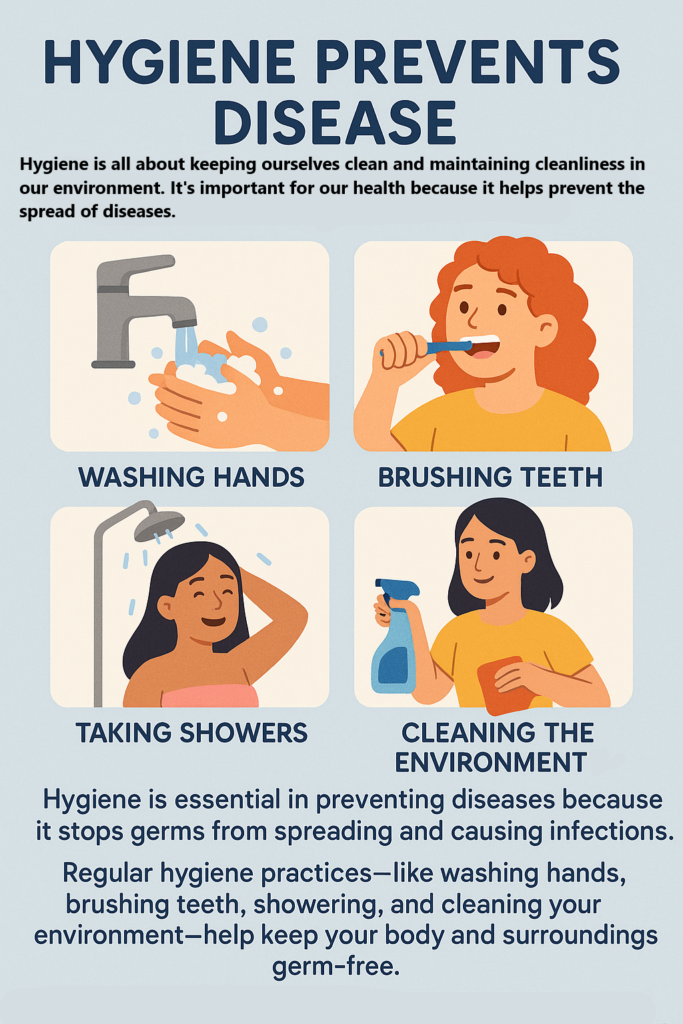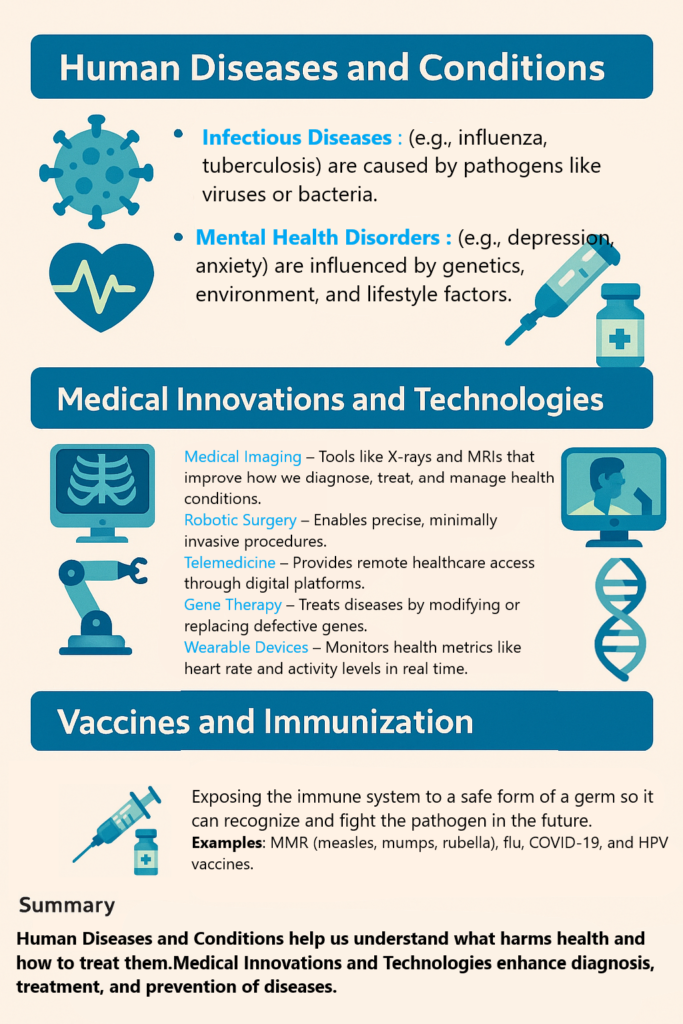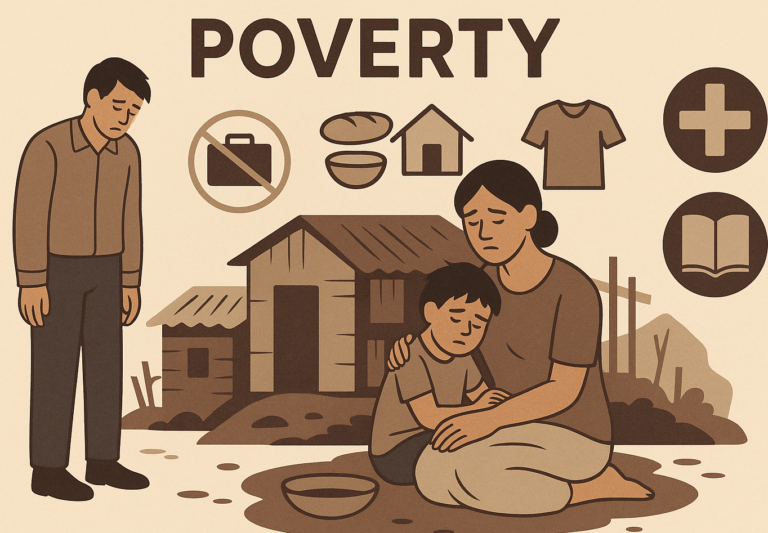Hygiene is all about keeping ourselves clean and maintaining cleanliness in our environment. It’s important for our health because it helps prevent the spread of diseases. Let’s break down why hygiene is so important in preventing diseases, in a way that’s easy to understand:

1. What is Hygiene?
Hygiene refers to practices that help keep our bodies, surroundings, and food clean. This includes things like:
- Washing hands
- Brushing teeth
- Taking showers
- Cleaning the environment (like your home and workplace)
- Cooking food safely
Good hygiene habits stop harmful germs (like bacteria and viruses) from spreading and causing sickness.
2. How Do Diseases Spread?
Many diseases are caused by tiny organisms called germs (like bacteria, viruses, fungi, and parasites). These germs can spread through:
- Air (like when someone with a cold sneezes)
- Water (dirty water can carry germs)
- Food (food can carry germs if it’s not handled or cooked properly)
- Touch (germs can live on surfaces or on your hands)
When you don’t follow good hygiene practices, germs can get into your body and cause diseases.
3. How Good Hygiene Helps Prevent Diseases:
Let’s look at how different hygiene habits help keep us healthy:
- Washing Hands: Our hands come into contact with many things throughout the day—like doors, phones, or money. Some of these things may have germs on them. When you wash your hands with soap and water, you wash away these germs, stopping them from entering your body through your eyes, nose, or mouth. This helps prevent colds, flu, and foodborne illnesses (like stomach bugs).
- Brushing Teeth: Brushing your teeth helps remove plaque (a sticky film of germs) that can build up on your teeth and gums. If you don’t brush, these germs can lead to tooth decay and gum disease. In some cases, poor dental hygiene can even lead to heart problems because of bacteria entering the bloodstream.
- Showering and Bathing: Your body picks up sweat, dirt, and germs throughout the day. Showering removes these things, keeping your skin healthy and preventing infections. If you don’t shower, germs can build up and cause skin conditions like rashes, acne, or fungal infections.
- Cleaning Your Environment: Keeping your home, school, and workplace clean is important for hygiene. Dust, bacteria, and viruses can spread on dirty surfaces. Regularly cleaning things like countertops, door handles, and phones helps reduce the chance of germs spreading to people.
- Food Safety: Washing your hands before cooking or eating is very important to avoid spreading germs to food. Also, keeping your kitchen clean, cooking food at the right temperature, and storing food properly help prevent foodborne illnesses (like Salmonella or E. coli).
4. Examples of Diseases Caused by Poor Hygiene:
- Common Cold & Flu: These are spread by germs that are passed when an infected person sneezes or coughs, and you touch a surface they touched.
- Stomach Infections: If you don’t wash your hands before eating or handling food, you might spread germs that cause diarrhea or vomiting (e.g., Salmonella).
- Skin Infections: Not showering regularly or touching dirty surfaces can cause rashes or fungal infections (like athlete’s foot).
- COVID-19: This virus spreads easily when people don’t wash hands, wear masks, or keep a safe distance. Proper hygiene practices like handwashing and disinfecting surfaces help prevent its spread.
- Dental Problems: Poor hygiene can lead to tooth decay, gum disease, and bad breath. This happens when food particles and germs build up in your mouth.
5. Basic Hygiene Practices to Follow:
- Wash Hands Regularly: Always wash your hands before eating, after using the toilet, and after touching anything dirty (like trash, public transport, or a pet).
- Brush and Floss Teeth: Brush your teeth at least twice a day for two minutes, and floss once a day to remove food particles and plaque.
- Shower Regularly: Take a shower at least once a day to remove sweat, dirt, and germs. If you exercise or get dirty, shower more often.
- Wear Clean Clothes: Change into clean clothes regularly to prevent germs from building up on your body.
- Keep Your Environment Clean: Clean your home regularly, wash dishes, wipe down surfaces, and keep things like your phone, doorknobs, and remote controls clean.
- Cook Food Safely: Wash your hands before cooking, store food properly, and cook at the right temperature to avoid foodborne illnesses.
6. Why Hygiene is Especially Important in Certain Situations:
- During Illness: If you’re sick or caring for someone sick, hygiene becomes even more important. Washing your hands often, using tissues, and disinfecting your space help stop germs from spreading to others.
- During Travel: When you travel to places where hygiene standards may be lower, it’s important to be extra careful with washing your hands and food. This helps prevent diseases like traveler’s diarrhea.
- In Hospitals or Clinics: Hospitals have many sick people, so good hygiene (like handwashing) is essential to prevent the spread of infections.
- In Schools: Schools are crowded with students who touch many things. Teaching kids good hygiene practices helps reduce the spread of germs and keeps everyone healthier.
7. The Impact of Poor Hygiene:
When people don’t practice good hygiene, it can lead to more sick days, more healthcare costs, and even outbreaks of diseases. Poor hygiene can also cause more serious health problems, like infections that can spread inside the body or make existing conditions worse.
8. Hygiene and Mental Health:
Hygiene isn’t just about physical health; it also affects your mental well-being. Feeling clean and taking care of your body can boost your mood, improve your self-esteem, and make you feel more comfortable in social situations.
In Summary:
- Hygiene is essential in preventing diseases because it stops germs from spreading and causing infections.
- Regular hygiene practices—like washing hands, brushing teeth, showering, and cleaning your environment—help keep your body and surroundings germ-free.
- By practicing good hygiene, you not only protect yourself but also help protect others from getting sick.
Good hygiene is a simple but powerful way to stay healthy and stop the spread of germs. So, remember to wash your hands, clean your surroundings, and keep yourself and others safe from disease











